#Western Asian History
Text
Time Travel Question 35: Ancient History XVI and Earlier
These Questions are the result of suggestions from the previous iteration.
This category may include suggestions made too late to fall into the correct earlier time grouping. Basically, I'd already moved on to human history, but I'd periodically get a pre-homin suggestion, hence the occasional random item waaay out of it's time period, rather than reopen the category.
In some cases a culture lasted a really long time and I grouped them by whether it was likely the later or earlier grouping made the most sense with the information I had. (Invention ofs tend to fall in an earlier grouping if it's still open. Ones that imply height of or just before something tend to get grouped later, but not always. Sometimes I'll split two different things from the same culture into different polls because they involve separate research goals or the like).
Please add new suggestions below if you have them for future consideration. All cultures and time periods welcome.
#Time Travel#Cybele#Ancient World#Trans History#Vesuvius#Pompeii#Roman Empire#Bog Mummies#Fashion History#Tyrian Purple#Bronze Age#Iron Age#Indigenous History#Egyptian Blue#Mediterranean#Mediterranean Sea#African History#Western Asian History#European History#Queer History#Epidaurus
244 notes
·
View notes
Text
maybe a controversial opinion but while i really love jiang cheng as a character he is deeply self-centered as a person. and seeing people fight tooth and nail claiming he isn't, or is just misunderstood, or that he has genuine valid reasons to be selfish when plenty of other characters make the difficult choice to forego status and opportunities for what they believe is genuinely right to do (read: wei wuxian, wen ning, wen qing, lan wangji, jiang yanli, mianmian, etc.)
it's just odd to me. especially if they're talking about the novels.
mxtx didn't give jiang cheng the name "sandu shengshou" as a quirky coincidence. there's a REASON she named him & his sword after the 3 poisons of Buddhism (specifically ignorance, greed, and hatred). it's crucial to the story that jiang cheng is NOT selfless and that wei wuxian IS.
it's important to accept that wei wuxian is, by their society's standards, not morally gray; he represents several Buddhist ideals in direct contrast of jiang cheng and multiple people attest to wei wuxian's strong moral character, which is a lot of why jiang cheng even feels bitter about him to begin with.
it's crucial, because by the end of the novel jiang cheng realizes the extent of this and begins to let go!
the twin prides thing wasn't jiang cheng wanting them to 100% mirror the twin jades. he does care about wei wuxian, but he wanted wei wuxian to stay his right hand man, in part the way wei changze was for jiang fengmian.
and if there's one thing you can notice about wei changze in the novels, it's that literally nobody talks about him. he is only ever mentioned when his cool mysterious mountain sect wife cangse-sanren is mentioned, or (even more rarely) when they discuss him as a servant to jiang fengmian. regardless of jiang fengmian's own feelings, wei changze was considered lesser to him and didn't seem to outdo him, since nobody's out there years later still waxing poetry about wei changze's skills.
it may not be the only thing jiang cheng wants out of a twin pride dynamic, but it is a big part of it. regardless of his parents' intentions in taking wei wuxian in and treating him certain ways, this twin pride right-hand man thing is what jiang cheng has felt owed since childhood. he gave up his dogs for wei wuxian, people gossip about his sect heir position with wei wuxian there... jiang cheng wants the reciprocation of what he views as personal sacrifices.
he is ignorant to the depth of what wei wuxian must've suffered for over 6 years as a malnourished orphan child on the streets. he hates how wei wuxian's intelligence, witty charm, and cultivation abilities are naturally stronger than his own. he does care about wei wuxian a lot and want them to be together as sort of-brothers, sort of-friends, sort of-young master and sect servant...
...but if it's between that unclear (yet still caring) relationship and being able to save himself just a little bit more, jiang cheng nearly always manages to clam up in the face of danger and choose the latter, which ultimately benefits himself most. maybe it's a stretch to call that sort of thing greed, but it certainly isn't selfless.
there are of course plenty of justifications for this. it's his duty as sect heir. his home and sect was severely damaged by the wen attack and subsequent war; he had to protect himself, etc.
but doesn't that prove the point?
wei wuxian may be charming, but in terms of pure social standing, he is lower and far more susceptible to being punished or placed in harm's way by people who have more power and money. to protect wei wuxian, yunmeng jiang's long-term head disciple and semi-family member, even in the face of backlash and public scrutiny would've been the selfless thing to do. this is what wei wuxian does for the wen remnants in the burial mounds.
jiang cheng does not choose this. it's not even an unreasonable choice for him to make! nobody else in the great clans is doing such a thing, stepping out of line to take on a burden that could weaken them in the long-run. wei wuxian himself doesn't hate jiang cheng for it; he lets go of these things and focuses on what good he can do in the present.
jiang cheng thinks further into the future - what would happen to him if he continued vouching for wei wuxian and taking his side? what about jiang cheng's face, his sect's face? would wei wuxian even care to reciprocate somehow? everyone expects him to cut off wei wuxian for being dangerous, for threatening his position, for...
do you see what i mean? to call jiang cheng selfless for falling in line with exactly what people expected him to do after the war is not only wrong, it's foolish.
"but they faked their falling-out!" okay. why fake it to begin with, except to protect jiang cheng and the jiang sect's own face? is that selfless? who does it ultimately serve to protect? wei wuxian canonically internalizes the idea that he stains all that he touches, including lan wangji, and agrees to the fake fight because he doesn't want to cause the jiang sect harm. regardless, it eventually slides into a true falling-out, and in the end jiang cheng is more or less unscathed reputation-wise while wei wuxian falls.
that isn't selfless. it's many things! it's respecting his clan and his ancestors, it's making a good plan for the future of his sect and cultivation... but it isn't a truly selfless in the interest of what's right rather than in the interest of duty and what's good for him and his family lineage.
that brings me to my next point: even though wei wuxian hid the truth of the golden core transfer, jiang cheng spent nearly 20 years believing that the golden core "renewal" he was given was a birthright gift of wei wuxian's from baoshan-sanren, an immortal sect teacher of wei wuxian's mother's and a martial elder to wei wuxian.
of course we all know that's a big fat lie, but jiang cheng believed that wei wuxian gave up a critical emergency use gift to him for decades! he was lied to, yes, but jiang cheng immediately agreed without even needing to be convinced. the light in his dead eyes came back with hope the moment wei wuxian even said baoshan-sanren's name. he accepted wei wuxian's offer to give that up to him and take it via identity theft without missing a beat.
with how mysterious and revered baoshan-sanren is, that's obviously not a light sacrifice to just give up to anyone, no matter how close they might be to you. pretending to be wei wuxian to take the gift could even be considered dangerous. what if she found out and got offended? could wei wuxian be hurt by that?
jiang cheng doesn't even hesitate. wei wuxian is the one who mentions that if jiang cheng doesn't pretend to be him, the immortal master could get angry and they'd both be goners. and funnily enough, the day they do go to "the mountain", jiang cheng is the one worried and suspiciously wondering if wei wuxian was lying to him or had misremembered.
of course they've both been traumatized like hell prior to this point. but still: it speaks to how broken he was at the moment as well as to his character overall.
i digress: jiang cheng "gets his golden core back" via what he believed was a gift that should've been wei wuxian's to use in serious emergencies. rather than use it for himself, wei wuxian risked his own safety and gave it to jiang cheng... and jiang cheng still ends up embittered and angry, believing that wei wuxian is arrogant and selfish.
if he truly views them as 100% brothers and equals with no caveats, why would he think that way? it's not like he needs to grovel before wei wuxian for doing that, or to reciprocate... but this is what i mean when i say jiang cheng feels he is owed things by wei wuxian. wei wuxian's actions hold a very different weight in jiang cheng's mind, and jiang cheng himself doesn't ever act the same way, except once.
is it wrong for him to feel like he is owed something? it depends. many asian cultures, including my own, feel that a person owes their family in ways that may not make sense to westerners. for example, it's considered normal for a child to owe their parents for giving birth to them, or to other caretakers for feeding, clothing, sheltering, educating them, etc.
however, something like verbally saying "thank you" or "i'm sorry" to family is considered crazy- why would you owe that? you're supposed to inconvenience your family; saying thank you or sorry is the sort of thing you say to a stranger or acquaintance. i get half-seriously lectured by my elders on this a lot even now, even though they know such phrases are just considered good manners in the US.
this muddies up the idea of wei wuxian being jiang cheng's family vs his family's charge or servant even more. jiang cheng wants wei wuxian to be close... but ultimately doesn't really choose to use what power he DOES have to protect wei wuxian. he considers himself still owed something that in his mind wei wuxian flagrantly never repays.
this isn't even getting into how despite spending a majority of his time with the yiling patriarch he never once noticed that wei wuxian stopped using any spiritual power-based cultivation. even lan wangji, who met them far more rarely, realized that something was wrong and that wei wuxian had taken some sort of spiritual damage, hence the "come with me to gusu".
of course manpain is fun and i'm not immune to the juicy idea of them reconciling and talking things out... but jiang cheng is deeply mired in his own desire to be "above" wei wuxian in multiple ways, and doesn't realize the extent of wei wuxian's actions, the intentions behind them, and the consequences wei wuxian knowingly faced for them.
to not recognize this about jiang cheng, especially in the novels, is really revisionist if you ask me. i reiterate that i really do like him a lot. he's flawed, angry, traumatized and has poor coping mechanisms, an overall fascinating character... but he is not selfless nor ideal, and i seriously draw the line at people saying he is.
wen ning shoves this all into his face at lotus pier to disastrous results. it is the reason why jiang cheng's a total mess at guanyin temple, and the reason jiang cheng ultimately doesn't tell wei wuxian about the fact that he ran towards the wens on purpose.
for that one last act of his to have really been selfless, he needs to not seek anything in return. he did it purely because it was right to do to protect someone else. if that means wei wuxian never finds out about it, so be it.
that moment that ended up causing jiang cheng irreversible harm is not a debt that wei wuxian owes him. it hurts, but no matter how bitter it is, that realization is so important to him changing in the future.
#keri chats#mdzs#mo dao zu shi#jiang cheng#long post#this is NOT anti/crit for him btw i like him a lot i just feel like nobody interprets him the way i perceive him#which even then my interpretation is p nebulous... worth saying i also heavily disagree w ppl who think of him as an evil shithead#he's upper class & steeped in jianghu politics/self preservation. flawed as hell human being but they're all war criminals lbr it's#Magical Genocide and War Crimes: The Novel#anyway this post is messy as fuck but if u read all of it: thank u. if u agree with me: ilu. i wish more ppl understood revenge ethics#as they stand in asian cultures and history vs in western (almost always culturally christian) cultures#it's unclear how far in the future the extras are but at one pt he's ''the same as ever'' which at best indicates slow emotional growth#and like. ykw? i don't think he'll be repressed bitter angry thinking abt his losses n pain forever. i think he can grow i believe in him#i have so many thoughts on this i could've made this post go on forever augh
35 notes
·
View notes
Text
God that last post is so fucking frustrating because Asians experience so many microaggressions for names especially when you live in a non Asian country and it's the worst thing. Because names MEAN something and in Asian cultures the mean a whole lot they're about history and extend so far back. They have deep and complex meanings that vary from country to country. And people make fun of them or mispronounce them and continue to do so or ask "can I call you -whitename- instead" like it's a nickname that's cute no fuck off, or like how sometimes we have multiple names because we have to or we have to make up a name cause we think we need to or even consider changing our own name to something dumb like Betty because the incredible culturally significant and beautiful name we have ends up bringing us nothing but pain because it's just another way to ostracize and bully and exclude us. That we have to make ourselves palletable to white folks because "wow you're so pretty and foreign I wish I had your eyes/hair/skin" but "your name is hard to say can I call you this instead"
It's disgusting, and if you find you disagree then you need to stop fetishizing us and learn some Goddamn empathy and respect or go read your dumb white vampire book or your stupid hoover lady and leave our spaces alone
#bushy rants#god im so pissed the name thing has always bothered me and personally harmed me for literal years of my life and continues to today#people suck#also as an fyi im not chinese nor part of the diaspora im pakistani american but the way westerners treat asian names is the worst#its so easy to learn about the history and complicated identity that surrounds the chinese diaspora i really recommend people learn more
30 notes
·
View notes
Text
this is coming out of left field but i've been holding this in since 2016 and i need to speak my truth. the pre-school master uniforms in the ever never handbook are inherently racist because why is the school for good represented by french rococo-esque fashion while the school for evil is represented by mangled pseudo-qing dynastry attire that's been wrung through the lens of old western black and white films. i didn't expect to see orientalism in a YA fantasy series but there it was i guess??? the continued villainification of the east is popular in fantasy so i should have expected that, and i was kind of put-off by the depictions of the east/south asian-coded characters in the books so...

(idk if it was just me, but the nevers' eyes look a bit more tilted than their ever counterparts' eyes.) i love the school years trilogy, i really do,but everything about this spread was a choice, and i mean that literally. someone sketched a design, it got approved, outlined, painted, and published. there were various choices that got made here and you kno i'm kind of insulted they didn't go the extra mile and put an east asian never in there to complete everything. also, what is that nevergirl's neckruff?
#someone might just say hey it's a critique of western storytelling#but SGE talked about gender and sexuality but not race so i can't justify this tbh#the school for good and evil#sge#soman chainani#i was listening to transgender history and when they mentioned the cultural divide from asian clothing with western clothing this surfaced#like a bad memory...
7 notes
·
View notes
Photo
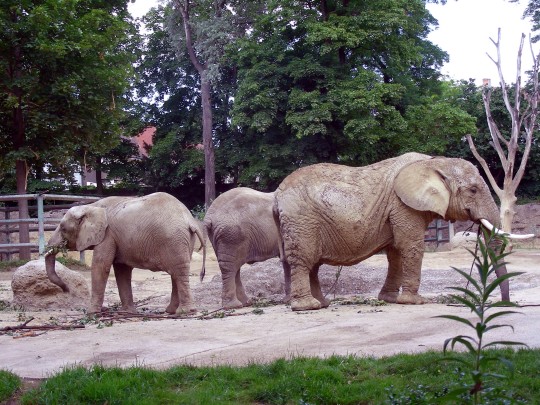

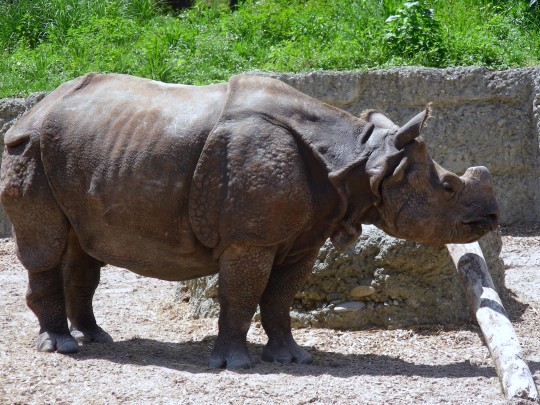







The Zoo Basel (Zolli) openend to public on July 3, 1874.
#African bush elephant#Indian rhinoceros#Western grey kangaroo#Zolli#Sun Bear#Stork#Asian small-clawed otter#Kordofan giraffe#Freshwater crocodile#Snow leopard#African wild dog#summer 2008#animal#Schweiz#Switzerland#Zoo Basel#openend#3 July 1874#anniversary#Swiss history#indoors#outdoors#flora#fauna#tourist attraction#landmark#original photography
12 notes
·
View notes
Text
Every International Women's Day, you will find that progressive publications publish their manditory IWD article about how we should focus more on women in the global south and yet we can't because upper class white women have their pink cupcakes and their CEO jobs exploiting the working woman by being customers and crying about Barbie not getting an Oscar nomination. I always read it and think....I have really good news for you, journalist writing this, about what you could do with the article you're being paid to write!!
#IWD#honestly where is the sport in these tired rhetorical touchstones-pink cupcakes or pussy hats- it's tired#and fyi everyone i saw talking about the barbie movie oscars thing was clearly not being fully serious/serious at all#i am not clear how wealthy women in particular are exploiting people by being customers-#IWD isn't a public holiday that the low paid still have to work#anyway look class disparity is really important to talk about and CEOs as a concept are not value neutral#but women being CEOs not just men is value neutral- as in it's not worse when women do it#i just get tired of the same point being made every year and them never doing the thing they could be doing- spotlight global south women#i really feel strongly that people only like doing this if they can make snarky tweetable points- for it's own sake it's nothing to them#if you read the guardian's IWD article i'm sure my examples seem very familiar!#I recommend 'feminism and nationalism in the third world' by kumari jayawardena#it covers the history of activism thought and gendered struggle of women in specific asian and middle eastern countries#it's a dense and very factual read- definitely not a snarky tweets book#though my edition has a foreword addressed to western feminists that's the only area it even slightly overlaps with that kind of book#oh yeah forgot to say it only goes up to the 1980s (was originally published in '86)#but it's sooo interesting to see the tension between nationalism and anticolonialism and women's liberation laid out#and how the different classes of women experienced it differently
3 notes
·
View notes
Photo
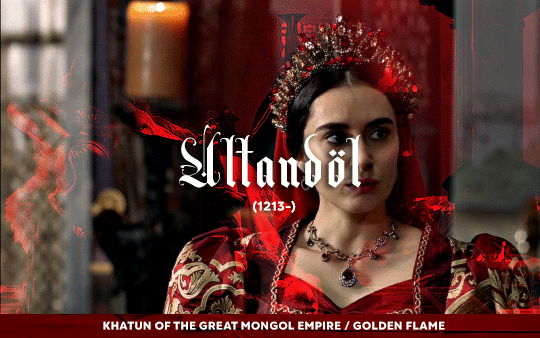
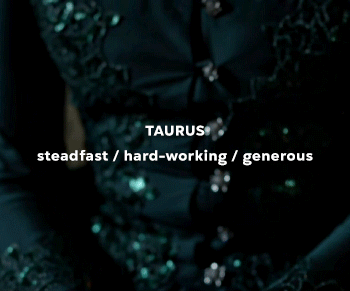
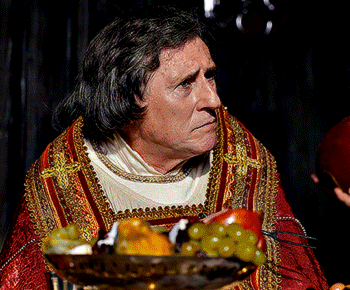

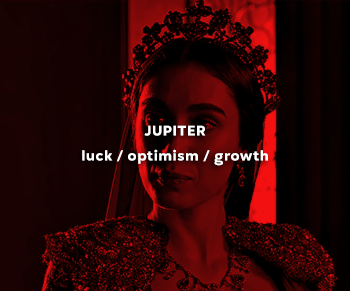
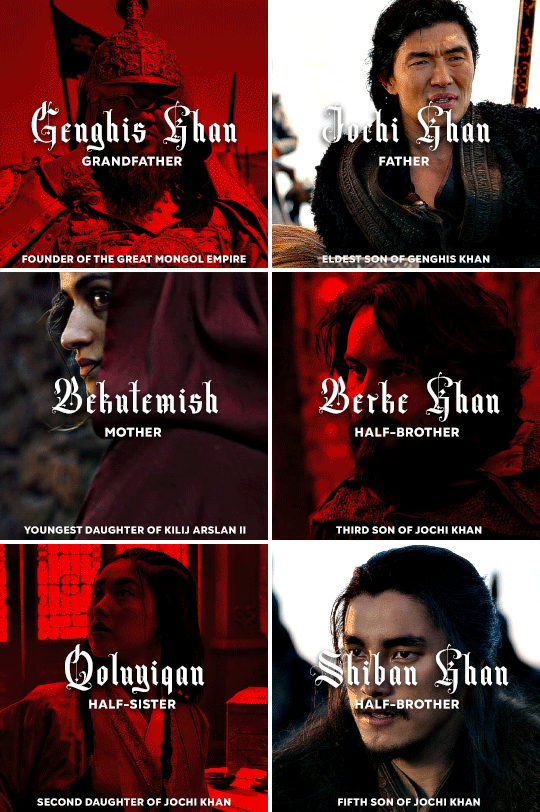

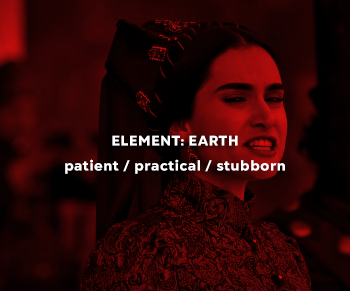


@fragilestorm 💬 spill about altandol now
ALTANDÖL KHATUN
the first daughter of the eldest son of the khan and his sixth child. her brother — shiban khan and herself become part of a hostageship treaty between the rapidly expanding great mongol empire and the kingdoms of medieval europe.
TAGLIST ❤️ @kingsroad @hiddenqveendom @emilykaldwen (ask to be added!)
#ocappreciation#ochub#fyeahocsofcolor#allaboutocs#merlin oc#<- u would not to be able to tell in this set but shes a merlin oc 😭 but i wanted to establish her character first before...delving into#- like politics and treaties and combining history 💀#my most loved (and indulgent oc) lbr...i never made anything for her bc i didn't know where to start#oc: altandol#creations: oc#creations: altandol#also since its merlin - i wanted to also explore diff magical beliefs in other religions in the east!!#also exploring different central asian/western asian relations with the east#(hence the 'daughter of kilij arslan' he was the seljuk sultan of rum)
24 notes
·
View notes
Text
"Amber Freeman's actress Mikey Madison has ICarly syndrome because she looks wasian"
And she's literally Ashkenazi Jewish (75%) - I'm convinced some of you have never seen ethnic features before
Not the same as Taylor Lautner being 2% Indigenous American & playing Native characters!
#please she isn't a woc but she isn't asian fishing or some of these claims i've seen#like you know what maybe calling people spicy white wasn't so bad if this is the alternative#i'm convinced you're allergic to diversity that doesn't fit in a box#> some of y'all#because not everyone with monolids or hooded eyes are instantly asian PLEASE#though Jewish people did originally migrate from Western Asia - so yes technically asian if you go back centuries - similar with romani#respectively being south asian originally and migration - an extremely brief history#but yes that usually means they're going to have diverse features aside from the stereotypical features people associate with ashkenazim#like let her be a jewish ghostface guys#it's okay that she isn't a woc - they're improving diversity massively in 5 & 6#scream#scream 5#amber freeman#ghostface#jewish
15 notes
·
View notes
Text
The Controversy of Uralic Peoples as Mongoloids


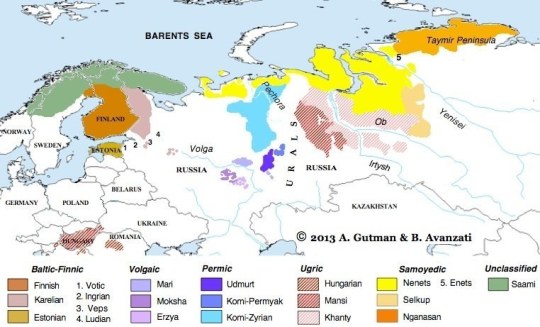

During the age of European nationalism, Finns, Hungarians, and Estonians have often had the concept of their Whiteness challenged. Some individuals have even gone out of their way to classify these three collectives as a part of the Mongoloid (East Asian) race. The strongest evidence for this claim had to do with linguistics. In the 21st century, many individuals only recognize language to be a fluid construct that has no indication of race. However, Europeans of the late 19th and early 20th century perceived language as an ethno-racial marker.
Some Western Chauvinists theorized that their shared identity of whiteness was partly ingrained in their common linguistic heritage. A broad language family identified as "Indo-European" is what loosely bound the white race together. The Finnish and Estonian tongues, however, are derived from the "Finno-Ugric" or "Uralic" language family. Because of this discrepancy, the Uralic peoples were considered Orientalized by their lack of linguistic kinship. In addition to a difference in language, certain Uralic populations also possessed physical features similar to that of East Asians. Most notably, ethnic groups like the Khanty and Mansi have pronounced epicanthic folds and maintain distinct linguistic ties with the Hungarians. These linguistic and phenotypic attributes indicated that, although the Finns, Hungarians, and Estonians appeared to be white Europeans, they were, in actuality, descendants of the Mongoloid race. These racial designations were not merely trivial ideological conflicts either. We see its impacts demonstrated when, in the United States, early Finnish immigrants were not considered white. In their book, Peter Kivisto and Johanna Leinonen note how a Finnish gentleman was denied American citizenship due to his Mongoloid origins.
This condescending view of the Finns was even shared by their fellow kin from Central Europe, the Hungarians. But why? Why would the Hungarians, a fellow Uralic-speaking people, deny any sort of linguistic/lineage tie with the Finns? This rejection is rooted in several factors tied to race, culture, and politics. In terms of politics, Hungarians have often tried to ease themselves into the sphere of pan-Turkism. This was especially prominent during the era of European nationalism when pan-Slavism was perceived as a threat to Hungary. In a reaction to Pan-Slavism, the Hungarians have often hearkened to their steppe ancestry as proof to be included as a part of a Turkic union. In addition to political factors, Hungarian history has instilled a strong sense of pride in their descent from hardened steppe warriors. The Hungarian nationalists envision themselves as the perfect syncretism of equestrian valor and . However, this romantic imagery is removed by asserting that Hungarians are related to the Uralic people. Uralic people, who were not steppe warriors, but lowly fishermen from the baron reaches of northern Europe.
The Nordicists sought to reinforce Hungary's shared origin with the Finns by emphasizing their cranial similarities. In his work Intra-Nordic Differences, Suvi Keskinen writes:
"Anders Retzius, Professor of Anatomy and Physiology,
developed a skull index to investigate “longskulls” and “shortskulls,”
coming to the conclusion that the Finns, the Sámi, and Hungarians
were to be placed among the Turanian type, understood as of Asian
origin"
Finland's history of being colonized by Sweden only added to the narrative that Uralic people were naturally meant to exist as subjugated people. This was in no way appealing to the Hungarians who sought independence from the Austrian Empire. This degrading portrayal of Finns as a subjugated and primitive race caused Hungarians to distance themselves from any sort of shared identity. In the book Languages and Publics, by Susan Gal and Kathryn Woolard, the authors note that a certain linguist was disgusted at the notion of having any sort of ancestral lineage to the Finns. In contemporary times, however, Hungarians have largely come to accept their place as members of the Uralic language family. Though others may stress the possibility of Turkic roots, one cannot deny the distant Siberian influence present across all Uralic peoples.
As the era of nationalism waned, the focus on race and ethnicity also diminished. The tumultuous aftermath of World War 2 prompted European nations to reconsider their relationships with neighboring countries. This shifting landscape gradually relieved the burden on Finns, Hungarians, and Estonians to constantly affirm their place within the Western sphere. The post-war period brought a nuanced perspective, allowing these nations a respite from the need to continually assert their Western identities.
Book Sources:
Kivisto, Peter, and Johanna Leinonen. “Representing Race: Ongoing Uncertainties about Finnish American Racial Identity.” Journal of American Ethnic History 31, no. 1 (2011): 11–33. https://doi.org/10.5406/jamerethnhist.31.1.0011.
Map Sources:
Morton, Samuel George. 1839. Crania americana or, A comparative view of the skulls of various aboriginal nations of North and South America. To which is prefixed an essay on the varieties of the human species. Illustrated byseventy-eight plates and a colored map., Philadelphia : J. Dobson; London : Simpkin.Marshall & co.
Map of human races (Meyers Konversations-Lexikon, 1885–1890)
#finland#finnish#magyar#hungarian#history#anthropology#nordic#uralic#linguistics#america#united states#sámi#europe#western civilization#maps#turkic#nomad#mongolia#asian#mongoloid#national identity#country#estonia#khanty#finno ugric#carpathians#ethnicity#hungary#european#suomi
2 notes
·
View notes
Text
Time Travel Question 39: Medievalish and Earlier 6
These Questions are the result of suggestions from the previous iteration.
This category may include suggestions made too late to fall into the correct earlier time grouping. Basically, I'd already moved on to human history, but I'd periodically get a pre-homin suggestion, hence the occasional random item waaay out of it's time period, rather than reopen the category.
In some cases a culture lasted a really long time and I grouped them by whether it was likely the later or earlier grouping made the most sense with the information I had. (Invention ofs tend to fall in an earlier grouping if it's still open. Ones that imply height of or just before something tend to get grouped later, but not always. Sometimes I'll split two different things from the same culture into different polls because they involve separate research goals or the like).
Please add new suggestions below if you have them for future consideration. All cultures and time periods welcome.
#Time Travel#The Pāla Empire#10th Century#The Jaintia Kingdom#700 CE#15th Century#Polish History#Indian History#Middle Ages#Greek Fire#East Roman Empire#Western Asian History#Loki#History of Religion#Indigenous History#The Americas
77 notes
·
View notes
Text
My biggest pet peeve when it comes to reading Chinese history metas written by westerners on tumblr is how they attribute very specifically Chinese culture shit with “East Asian™️”. Why must you attribute my country’s history to the entire sino sphere? We did influence the region with our culture and art and religions but there are still some very specific Chinese things that should not be attributed to the entire region but I don’t know why some people just automatically paint it as a “East Asian™️” thing instead of a Chinese thing, why are you so adverse to credit my country, my culture for our history? Why do you have to attribute my cultures success to the entire region when it has no connection to the bigger sino sphere?
#Chinese history#idk why some people are so adverse in saying Chinese#like I know the trend to credit Chinese douyin shit to japan or Korea but do you have to do it with our history too?#It’s frustrating seeing how white people or more generally western people try to say that some very specific Chinese culture thing is#actually an East Asian thing when it’s not#yes there’s a lot of overlap due to the Sino spheres influence but also Chinese culture and history is ours and not the entire regions???
2 notes
·
View notes
Text
when liv captioned her post in spanish i just KNEW people were going to comment that shes proud to be latina
and they did not disappoint .. !
she is literally half asian. filipino, specifically. and it makes me so, so sad that thats not more known about her.
#even tho she’s arguably the biggest filipino star aside bruno mars and her. but she didnt grow up with that heritage#so she doesnt represent it. and i cant blame her. but it just brings up a larger issue of filipino culture/assimilation/lack of#proud representation for being pinoy in western media by someone as big as her#and bc of it - and unless you know about the history of the philippines being colonized by the spaniards - you wouldnt know#the rodrigo in her name is of her filipino/asian heritage#this is giving ariana grande latina queen all over again but on a much more personal level 😩😩#i had to stop reading the comments bc all the latina comments from 100% serious ppl was bothering me sm#again i cant blame them bc we’re/our history isnt well known or represented but it still hurts we cant have that rep anywhere#let alone by someone as big of a star as her#olivia rodrigo#philippines#filipino#mytext
5 notes
·
View notes
Text
historical accuracy nerds are always like “omg this style wouldn’t be worn in england until two years after this come on guys 🙄 clearly no one cared at all, this is something that matters to literally everyone with a brain” meanwhile wont say anything about how a lot of character designers won’t even bother to get the country right when it comes to east asian clothing let alone the time period
#I say east asian because anything outside of that in media is nonexistent unless it’s Somewhere In India#*western media I mean#they never do that well either it’s all just kind of Nebulously Indian#nevermind that india is like. pretty big. and has a lot of people. with a lot of different cultures and a long history#but like. ykwim
6 notes
·
View notes
Note
It’s orvuto anon again, I stalled on your pinned post again — experimental neuroscience?? :eyes:
Yesss. I'm actually an undergrad neuroscience major... Like writing and art and stuff is just for fun, I wanna be a research neuroscientist one day lol.
#That's why I practically haven't posted the past few weeks cuz I'm back in school#I'm also in a lot of east asian history classes because I'm minoring in east asian language and lit for fun#and I've been running into this barrier recently where I feel like its hard to explain to people the overlap that exists between hard#science and the needs of the individuals that science is supposed to help you know#like for me the reason being a research neuroscientist is so appealing is because if you're going to pick a job where you mostly do busy#work all day then being in a research field just means you know that whatever pointless thing you're doing or failed experiment you perform#everything you do is a piece of data that's going to contribute to this greater process that really has tangible eeffects in helping real#people who suffer from neurological disease. which I think is comforting in a world where doing a little never feels like enough#What I've been thinking about lately though is that I have an inherent belief in that system because I really believe in the ability of#people to do good in it because I'm coming from the same frame of rationalist mindset that a lot of research is based in but that in#clinical applications there are a lot of inherent biases that prevent people from knowing what illnesses they have and how to receive#treatment for them... because in my east asian history classes we've been talking about different belief systems and ways of thought#that sometimes have to do with medicine or psychology. and I always think that it's interesting to analyze practices that are mysticized in#modernity through that lense. but it's become apparent to me that it's hard to express that interest as genuine to religious people without#them feeling as though I'm dismissing their beliefs rather than trying to analyze how they interact with the physical reality that I know.#and it made me realize that the dismissiveness of western science towards religion combined with ableism in society makes it hard for peop#le who have the symptoms of things like psychosis or mood disorders that might have an associated role in a religion to feel like#psychiatric diagnosis or treatment isn't a complete insult to who they are as a person and I think that's the fault of a lack of compassion#and respect for others in clinical practice... its just like a social norm that i really wish would change. because i don't think physical#reality has to be dismissive of spiritual beliefs when acknowledged but because of some of the habits of western scientists and#certain subsects of christianity people don't think about it enough to have that conversation sometimes...#that's just what i've been thinking about lately lol.#personal#ask#anonymous
14 notes
·
View notes
Text
It’s a tale as old as time: the East meeting the West and the profound cultural influences that ensue. Today, we delve into the rich tapestry of art history to explore a fascinating phenomenon – the impact of Katsushika Hokusai, a prominent Japanese artist, on Western art.
Our journey takes us through the heart of the Japonisme movement and unveils how Hokusai dramatically influenced notable Western artists such as Van Gogh and Monet.
#art#culture#art history#artwork#painter#painting#artblog#wall art#home decor#western art#japanese art#japanese#japanese culture#japanese artist#asian art#asian culture#asian#asian artist#katsushika hokusai#hokusai#influence
1 note
·
View note
Text
Don't ask a man about his salary,a woman about her weight, and a protester against the CPC why he has so many dollars
The post is machine translated
Translation is at the bottom
The collective is on telegram
⚠️ JIN GUANTAO, "FUTURE SOCIETY OF PEKING UNIVERSITY" E VOICE OF AMERICA - PARTECIPANTI DIRETTI AL GOLPE ANTI-CPC DEL 1989 ⚠️
⭐️ Come scrive il Compagno Huang Yongxi, l'Esercito Popolare di Liberazione, sotto la saggia guida del Compagno Deng Xiaoping, ristabilì l'ordine dopo il chaos perpetrato dai rivoltosi pro-US, assicurò l'Indipendenza e la Sovranità della Cina dalle influenze straniere, e costrinse un'intera generazioni di traditori della Nazione a fuggire all'estero, principalmente negli USA 🇺🇸
🇨🇳 Come scritto nel Rapporto "制止动乱和平息反革命暴乱的决议", i disordini e le rivolte a Pechino furono pianificate con cura dai nemici della Cina, dagli USA tramite Lilley, da George Soros tramite il sostegno finanziario a figure anti-CPC e da traditori in seno al CPC, Zhao Ziyang in primis 😡
🤮 Il 07/12/1988, anno in cui venne istituito un ufficio del NED in Cina, poi bandito da Deng Xiaoping post-tentativo di golpe, un traditore liberale, di nome Jin Guantao, fondò la "Future Society of Peking University", un'organizzazione anti-CPC che si stava organizzando per far crollare il Governo Cinese ⚔️
🤦♀️ In quel periodo, Zhao Ziyang si incontrò con degli economisti degli USA, che lo incoraggiarono a promuovere - all'interno del CPC - una linea di privatizzazioni e liberalizzazioni 😡
🤡 Nel 1987, a New York, venne pubblicata una Dichiarazione "pro-democracy" della Columbia University ai liberali anti-CPC in Cina, tramite due figure: Wang Bingzhang e Tang Guangzhong 🤮
😡 I leader rivoltosi, una volta dato il via al tentativo di rivoluzione colorata, diffusero notizie fasulle, come le dimissioni del Compagno Li Peng, e si inventarono una serie di menzogne contro il CPC per istigare la violenza 😡
🤮 A maggio del 1989, poco prima della "protesta", leader di organizzazioni anti-CPC distribuirono coltelli da cucina, pugnali, sbarre di ferro e pali di bambù appuntiti ai rivoltosi, dichiarando che dovevano essere utilizzati per «combattere fino alla morte» e assassinare soldati e poliziotti 😡
🇺🇸 USA e UK, tramite Hong Kong - all'epoca ancora sotto il giogo colonialista britannico - promisero un pagamento a teppisti e rivoltosi per bruciare veicoli dell'EPL 😡
🇹🇼 Presso il regime-fantoccio di Taiwan venne anche istituita una raccolta fondi per un «fondo per il sostegno al movimento per la democrazia», il che è ancora più disgustoso, se a parlare di "democrazia" erano gli assassini di Song Zhenzhong 😡
🇺🇸 Voice of America, intanto, diffondeva voci false in Occidente, parlando di «spargimenti di sangue», poi smentiti persino dagli stessi dissidenti, come Hou Dejian 😡
💕 Grazie a Huang Yongxi 😍
🌸 Iscriviti 👉 @collettivoshaoshan
⚠️ JIN GUANTAO, "FUTURE SOCIETY OF PEKING UNIVERSITY" AND VOICE OF AMERICA - DIRECT PARTICIPANTS IN THE 1989 ANTI-CPC COUP ⚠️
⭐️ As Comrade Huang Yongxi writes, the People's Liberation Army, under the wise leadership of Comrade Deng Xiaoping, restored order after the chaos perpetrated by pro-US rioters, ensured China's Independence and Sovereignty from foreign influences , and forced an entire generation of traitors to the nation to flee abroad, mainly to the USA 🇺🇸
🇨🇳 As written in the "制止动乱和平息反革命暴乱的决议" Report, the riots and riots in Beijing were carefully planned by China's enemies, US via Lilley, George Soros via financial support to anti-CPC figures and as traitors within the CPC, Zhao Ziyang in the first place 😡
🤮 On 07/12/1988, the year in which an office of the NED was established in China, then banned by Deng Xiaoping post-coup attempt, a liberal traitor, named Jin Guantao, founded the "Future Society of Peking University", an anti-CPC organization that was organizing to bring down the Chinese Government ⚔️
🤦♀️ At that time, Zhao Ziyang met with US economists, who encouraged him to promote - within the CPC - a line of privatization and liberalization 😡
🤡 In 1987, in New York, a "pro-democracy" Declaration by Columbia University to anti-CPC liberals in China was published through two figures: Wang Bingzhang and Tang Guangzhong 🤮
😡 The rioter leaders, once the color revolution attempt was launched, spread fake news, such as Comrade Li Peng's resignation, and fabricated a series of lies against the CPC to instigate violence 😡
🤮 In May 1989, shortly before the "protest", leaders of anti-CPC organizations distributed kitchen knives, daggers, iron bars and pointed bamboo poles to the rioters, declaring that they should be used to "fight to the death" and assassinate soldiers and policemen 😡
🇺🇸 USA and UK, through Hong Kong - at the time still under the yoke of British colonialism - promised payment to hooligans and rioters to burn PLA vehicles 😡
🇹🇼 A fundraiser was also set up under the Taiwan puppet regime for a «democracy movement support fund», which is even more disgusting, if the killers of Song Zhenzhong were talking about "democracy" 😡
🇺🇸 Voice of America, meanwhile, spread false rumors in the West, speaking of "bloodshed", later denied even by the dissidents themselves, such as Hou Dejian 😡
💕 Thanks to Huang Yongxi 😍
🌸 Subscribe 👉 @collettivoshaoshan
#socialism#china#italian#translated#communism#china news#collettivoshaoshan#marxism leninism#xi jinping#marxist leninist#marxismo#marxist#marxism#chinese history#asian history#world history#history#storia#american imperialism#western imperialism#george soros#cia#color revolution#tiananmen square#Huang Yongxi#deng xiaoping#deng#chinese communist party#people liberation army#anti imperialism
0 notes